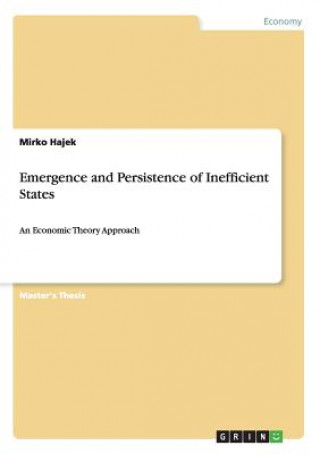
Kód: 09929482
Emergence and Persistence of Inefficient States
Autor Mirko Hajek
Master's Thesis from the year 2014 in the subject Economics - Other, grade: 1,0, University of Leipzig (Institut für Theoretische Ökonomie), course: Masterarbeit, language: English, abstract: Bureaucratic inefficiency, patronage-i ... celý popis
- Jazyk:
 Angličtina
Angličtina - Vazba: Brožovaná
- Počet stran: 92
Nakladatelství: Grin Publishing, 2015
- Více informací o knize

Mohlo by se vám také líbit
-

Intimacy In Inconsequential Moments
1260 Kč -

Competencies at Work
523 Kč -

Are you the Pirate Captain?
222 Kč -

Hard'n-Back
853 Kč -

Ein Kurs in wahrem Loslassen
511 Kč
Dárkový poukaz: Radost zaručena
- Darujte poukaz v libovolné hodnotě a my se postaráme o zbytek.
- Poukaz se vztahuje na celou naši nabídku.
- Elektronický poukaz vytisknete z e-mailu a můžete ihned darovat.
- Platnost poukazu je 12 měsíců od data vystavení.
Více informací o knize Emergence and Persistence of Inefficient States
Nákupem získáte 170 bodů
 Anotace knihy
Anotace knihy
Master's Thesis from the year 2014 in the subject Economics - Other, grade: 1,0, University of Leipzig (Institut für Theoretische Ökonomie), course: Masterarbeit, language: English, abstract: Bureaucratic inefficiency, patronage-induced overstaffing, and outright corruption retard economic development and reduce public well-being in developing countries. They prevent governments from effectively carrying out the economic plans to which they devote so much official attention, and deprive citizens of government services to which they are legally entitled. (Geddes 1991, p.371)§Corruption, patronage and inefficient bureaucracies are widespread in many countries and under all forms of government. Whereas such problems are often recognized to be at the core of rent-seeking regimes like dictatorships or oligarchies, they occur in similar ways in developing and even in developed democracies. For instance, there is evidence for bureaucratic inefficiency, corruption and patronage in Brazil (Weyland 1996), but also in Germany (Braendle 2012) and France (Facchini and Melki 2013).§A rich body of research however underlines the importance of good institutions as main determinants of economic development, growth and prosperity. But why and under which conditions do some societies choose inefficient institutions? This is the main question the thesis seeks to answer.§A related second question concerns a possible explanation for the setup of inefficient institu- tions: Why do democracies often pursue relatively elite-biased policies contrary to the predictions of the median-voter-theorem? As Acemoglu (2010, p.1) notes, institutions are often "structured to maximize the rents captured by the elite, the individuals or social groups monopolizing political power". In electoral democracy, the influence of different social groups should be closer related to their population share than in nondemocracy. However, the distribution of political power can by diluted if institutions reshape political influence and redirect government spending towards the top.§The thesis tries to bring together the two issues by elaborating a possible explanation for the link between the emergence of inefficient institutions and the prevalence of pro-elite policies.
 Parametry knihy
Parametry knihy
Zařazení knihy Knihy v angličtině Economics, finance, business & management Economics
1704 Kč
- Plný název: Emergence and Persistence of Inefficient States
- Podnázev: An Economic Theory Approach
- Autor: Mirko Hajek
- Jazyk:
 Angličtina
Angličtina - Vazba: Brožovaná
- Počet stran: 92
- EAN: 9783668051645
- ISBN: 366805164X
- ID: 09929482
- Nakladatelství: Grin Publishing
- Hmotnost: 132 g
- Rozměry: 210 × 148 × 6 mm
- Datum vydání: 30. September 2015
Oblíbené z jiného soudku
-

Principles for Dealing with the Changing World Order
534 Kč -

Team Topologies
511 Kč -

Freakonomics
213 Kč -

Misbehaving - The Making of Behavioral Economics
284 Kč -

Indispensable Milton Friedman
646 Kč -
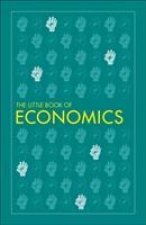
Little Book of Economics
276 Kč -

Why Nations Fail
276 Kč -

Pyramid Principle, The
1268 Kč -

Essential Mathematics for Economic Analysis
1840 Kč -
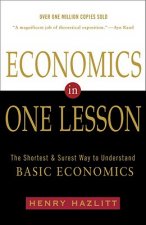
Economics In One Lesson
373 Kč -

Predictably Irrational
389 Kč -

Price of Inequality
284 Kč -

(Mis)Behaviour of Markets
357 Kč -

Debt, 10th Anniversary Edition
651 Kč -

A-Level Economics: Year 1 & 2 Complete Revision & Practice (with Online Edition)
700 Kč -

The Invisible Hand
196 Kč -

Liar's Poker
304 Kč -

Rational Optimist
276 Kč -

Irrational Exuberance
487 Kč -

Art of Statistics
306 Kč -

Scrum - A Pocket Guide - 3rd edition
563 Kč -

Hypomanic Edge
505 Kč -

How I Made One Million Dollars Last Year Trading Commodities
987 Kč -

Misbehavior of Markets
584 Kč -

Econometric Analysis, Global Edition
2129 Kč -

Cartoon Introduction to Economics
462 Kč -

Economics: The User's Guide
358 Kč -
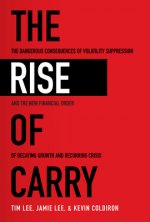
Rise of Carry: The Dangerous Consequences of Volatility Suppression and the New Financial Order of Decaying Growth and Recurring Crisis
644 Kč -

Myth of Capitalism - Monopolies and the Death of Competition
537 Kč -

How Rich Countries Got Rich and Why Poor Countries Stay Poor
410 Kč -

Business Etiquette in Brief
311 Kč -

Intermediate Microeconomics and Its Application
2616 Kč -

Are the Rich Necessary?
312 Kč -

Economic Point of View
667 Kč -

Discovery, Capitalism & Distributive Justice
542 Kč -

Driving Digital Transformation
543 Kč -

Start-Up Nation
254 Kč -

Economic Facts and Fallacies
423 Kč -

Decision Book
447 Kč -
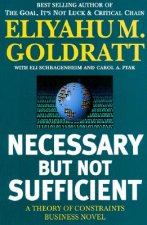
Necessary but Not Sufficient
407 Kč -

Freakonomics
182 Kč -

Economics Book
545 Kč -

Leading at a Higher Level
963 Kč -

Principles of Economics
392 Kč -

Macroeconomics For Dummies
581 Kč -

45 Second Presentation That Will Change Your Life
361 Kč -
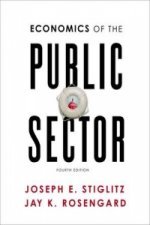
Economics of the Public Sector
2059 Kč -

Factfulness
258 Kč -

Currency Wars
410 Kč
Osobní odběr Praha, Brno a 12903 dalších
Copyright ©2008-24 nejlevnejsi-knihy.cz Všechna práva vyhrazenaSoukromíCookies



 Vrácení do měsíce
Vrácení do měsíce 571 999 099 (8-15.30h)
571 999 099 (8-15.30h)